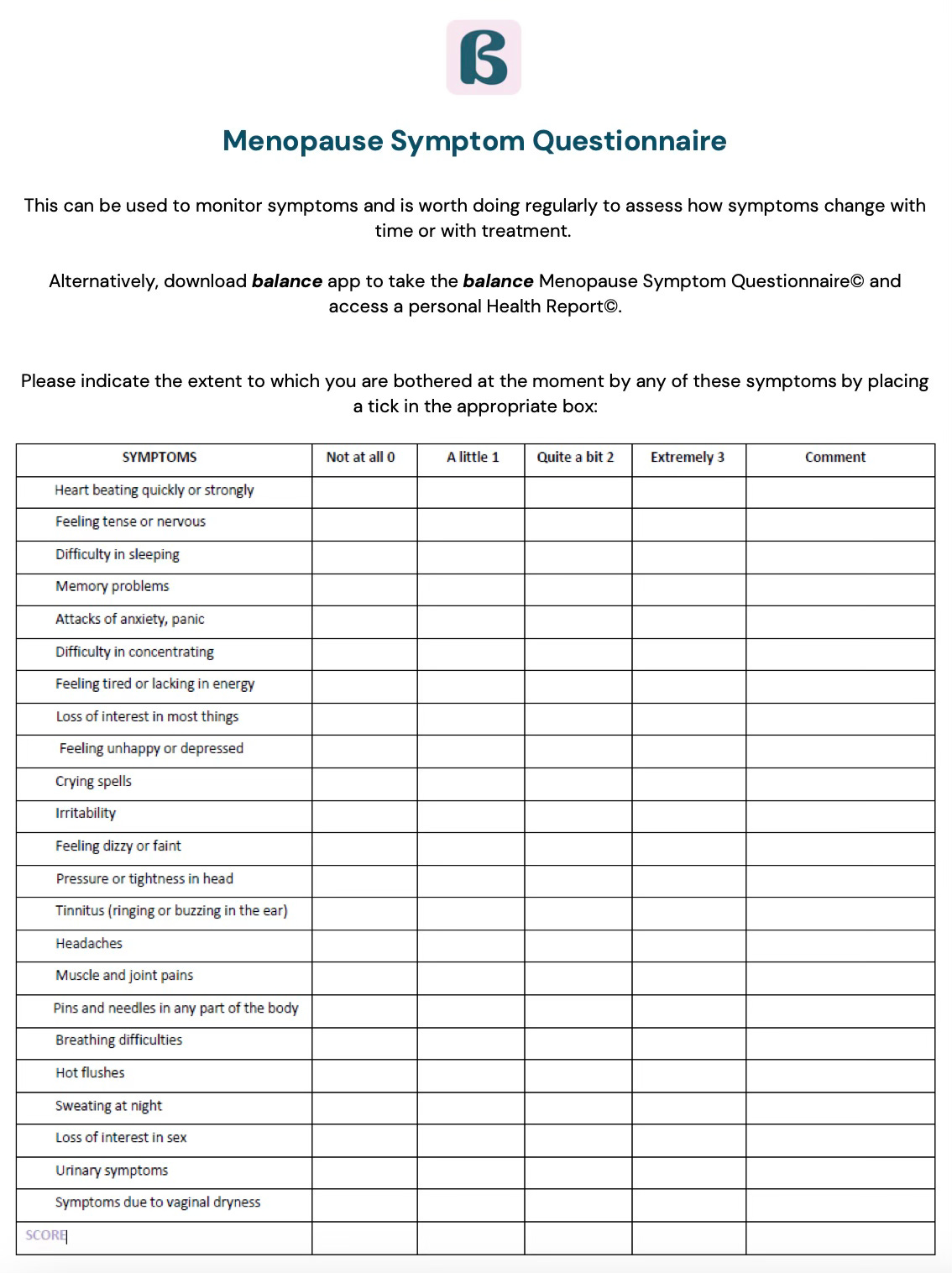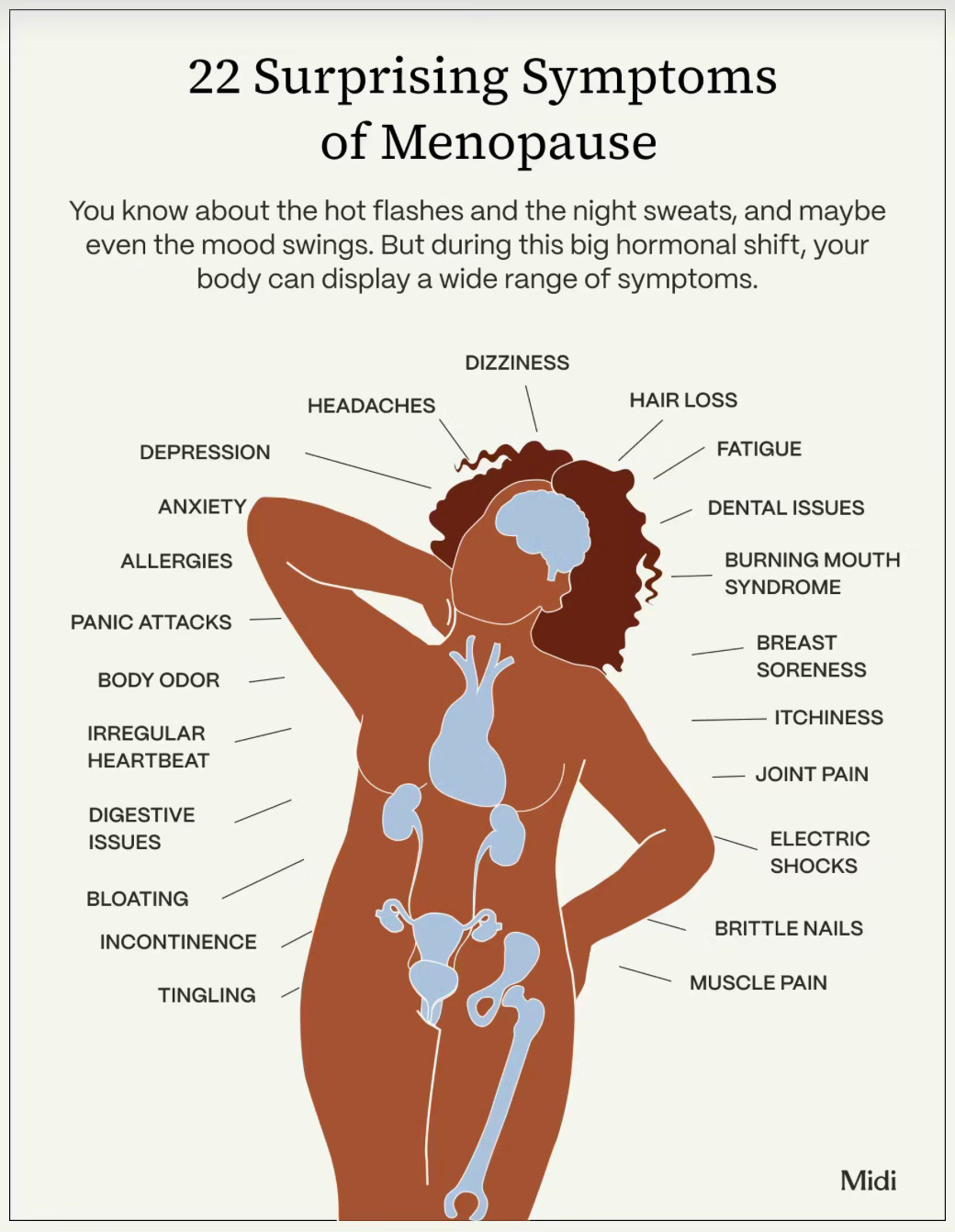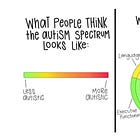Hi Team Auti Peri,
My autistic perimenopause is an absolute shitshow right now. How is yours treating you?
This week I have had bodily aches and last night I convinced myself to do the five minute evening yoga flow that used to be habitual. I don’t know if my body was aching because I hadn’t been doing it but, just as I was gently finishing triangle pose a muscle below my left hip absolutely wrenched itself! I couldn't breathe, whilst *trying* to breathe into it (those hypnobirthing sessions I took ten years ago are still paying off, baby! Ha ha, “baby”! Geddit?)
Wincing, I hobbled all the way to the kitchen (where, alas, no soothing birthing pool and kind doula was awaiting me), grabbed the ice pack from the freezer and double dropped paracetamol. Inserted two Utrogestan (progesterone capsules) you know where, slapped my night time pump of oestrogen gel onto my arm and hoped it would soon stop hurting.
Thanks to extreme HRT-defying levels of insomnia, I woke up several times in agony, struggling out of one awkward sleeping position into another. Nothing would stop it hurting, and 24 hours later it still hurts.
Yes, I must have pulled a muscle, and normal injuries will occur in midlife. But I’ll be damned to believe that this agonising muscle pain isn’t distinctly down to perimenopause. Do I have evidence of this? Nope - you and I know I have no medical training whatsoever, apart from that one day first aid refresher course I took a decade ago.
But, I know this is perimenopause! And I don’t know why I am still symptomatic when I am in a chemical menopausal state (it’s temporary, and reversible, much to my ongoing distress) caused by hormone blockers to alleviate my very late diagnosed premenstrual dysphoric disorder (PMDD). Alongside this treatment I am on carefully titrated hormone therapy (HRT/MHT) and things should be settled.
I have never felt any less settled in my life!
Fortunately I have doctors who are validating my lived experience of autistic perimenopause, and are empathising with my ongoing onslaught symptoms. I am waiting to see a public gynaecologist to have EVERYTHING removed by hysterectomy ASAP before I go completely out of my own mind.
But what is it like when our doctors don’t believe us? When they dismiss our symptoms, and struggle to engage with our autistic communication?
What is it like to be told by medical “experts” that, not only are you not autistic (“Or you wouldn’t be here and giving me eye contact”), but that you are “too young to be perimenopausal”.
If you have heard either or both of these statements, welcome to the club.
Just because they dismiss you, doesn’t mean you are wrong. Only you know what is happening in your body and mind for you at any given time. If they don’t understand that, I would recommend getting a second opinion.
If that isn’t possible, you can take notes using a symptom tracker as supporting evidence. You may also wish to take along a trusted person who can advocate alongside you. Surely it’s harder for them to dispute you both? I would like to think so, anyway.
Okay, so I am going to make some bold claims here. I have little to no supporting research, because there isn’t enough research into perimenopause, and the experts are still arguing amongst themselves and invalidating perimenopausal people everywhere. But I read all the time about seemingly random symptoms that occur in midlife that may be perimenopause related.
Some of them may seem obscure. Perhaps they are, but those of us with interoception differences (either having heightened or reduced sensitivities in our internal states) are easily dismissed by healthcare practitioners.
Speaking to you as an advocate in a peer support role, not from a medical background, I want to remind you - again - that if a doctor minimises your lived experience, it doesn't mean you are imagining these symptoms.
For example, a common symptom is for menopausal people to experience brain fog. Often to the extent where we believe we are losing our minds, or in early stage dementia.
This feels terrifying and shameful. We may feel like a burden to others and that our loved ones are better off without us.
Please believe me when I tell you that lots of people feel this way, and I receive many comments and messages about this. It is not an uncommon experience, and it may be more widely experienced in the neurodivergent community, since many of us have been living with brain fog all our lives. At perimenopausal onset, our cognition may feel like it has dropped off a cliff. That is the inspiration for the latter part of my publication’s title: A Temporary Regression.
I want to normalise this phenomenon.
Oddly though, there are still doctors who say there is no empirical evidence that brain fog exists as a phenomena in perimenopause, which I frankly find ludicrous.
There are many other symptoms that are more commonly experienced, but are kept on the down low due to societal taboos. Namely: low/no libido, and dry and/or atrophied vaginas and vulvas.
Atrophy isn’t what it sounds like. Your skin may be sore or raw, you may have recurrent urinary tract infections (UTIs), but if you are waiting for your cervix to prolapse via your vag and descend out of your labia before you will eventually see your doctor, you are in for a horrendous time.
I wrote about this a long time ago, so am re-sharing my post on vaginal atrophy in case you are interested (no OnlyFans content, I promise):
When is a vagina not a vagina? When it’s A Trophy! 🏆
Autistic people feel things deeply to our very core, to our bones. We can sometimes hear the rush of our own blood coursing through our veins. Feel our heartbeat thumping in our throats. Hear ourselves chewing our food and think we are deafening everyone around us for miles and miles and miles. Hear other people chewing…
We all know what the regular symptoms of peri/menopause are, right? Here is a quick refresher, with thanks to the Australasian Menopause Society (factsheet and infographic):
Changes in menstrual periods is an early symptom
Hot flushes
Night sweats
Problems sleeping
Pain in your joints
Tiredness
Anxiety or mood changes
Dry vagina
Overactive bladder or discomfort
But these stereotypical symptoms are just the tip of the iceberg.
Well, maybe a better analogy would be a cliff face, with the main symptoms at the top, and the lesser known ones near the middle and bottom. If you get any or all to an extreme degree, you too may feel like you have been drop kicked off the top of the cliff, spiralling as you helplessly descend, hitting the ground hard, and feeling left for dead.
I will spare you an infographic accompaniment to that gory metaphor…
Delving deeper into the research 👓 we will find that around 34 symptoms are commonly stated:

I haven’t found an extensive symptom checker, but more comprehensive lists are available. It is strange and unhelpful that menopause organisations list many possible symptoms, yet produce woefully short charts and trackers. Don't they know that we need thorough and comprehensive information?! Haven’t they heard of autistic perimenopause??!!
No and no.
So let’s keep pushing through. I hope you are still with me. Please don’t give up hope. I know of many excellent academic researchers pushing for our recognition and validation, but that is a long drawn out public dissemination process. Not to mention getting that information into policies, medical schools and primary care/GP practices.
Whilst we wait for them to catch up with what we already know, we need to keep educating ourselves and staying in community.
***Hours of Googling later… If the academics don’t know this stuff, let’s not expect AI to have a clue!***

The Join the dots: A-Z symptoms list is useful as the list includes a description of each of the symptoms listed. Please open the link for all the list items.
There are other symptoms that are less taboo and more obscure. They crop up in midlife and we don’t realise they may be due to extreme hormonal flux.
Here they are:
Cold flushes
Scalp tingling
Metallic taste in mouth
Tennis elbow
Frozen shoulder
Dry eyes
Bloating
Blood sugar dysregulation
Phantom smells
Hair loss/thinning/receding hairline
Increased facial and bodily hair growth
Tinnitus
Breast pain
Bleeding gums
Dental problems
Burning mouth syndrome
Electric shocks
Brittle nails
Dizziness
Hormonal acne
Osteoporosis
Roasacea
Body odour
Melasma (darker patches of skin, usually on the face)
Heart palpitations
Sudden onset of phobias (e.g. driving)
Body temperature dysregulation
Formication (sensation of insects crawling on the skin)
Weight gain
Headaches/migraines
Digestive issues
Skin tingling
Sources of obscure symptoms:
Uncommon Signs & Symptoms Of Menopause
What Are the Most Surprising Menopause Symptoms?
10 surprising menopause symptoms

I feel like the dyspraxic NDers amongst us 🙋♀️ will be all too familiar with this one already:
Changes in spatial awareness
During the menopause, changes in the perception of depth of vision can occur, which can affect your awareness of surroundings. Your concentration can sometimes dip during this time, and your eyes can become drier. This can lead to clumsiness or being more accident prone.
Source: HCA Healthcare UK 18 signs of the menopause that you might have missed
Not to mention those of us who are self-identified or formally diagnosed as ADHD:
Other Psychological and Behavioral Changes
Conditions like obsessive-compulsive disorder (OCD) or attention-deficit/hyperactivity disorder (ADHD) have been shown to appear or worsen at menopause. Hormonal fluctuations change how your brain functions, and some women may experience:
When it happens: Changes in mood and behavior can start in perimenopause.
Possible symptoms include:
Impulsivity or risk-taking behavior
Heightened sense of caution or anxiety bordering on paranoia
Compulsive or repetitive behaviors (e.g., checking or cleaning)
Source: Midi The Complete List of Menopause Symptoms
Yes, Midi, and the rest! 📋 🧠 🛑
A lot of these symptoms may already be part of our neurodivergent experience of being in the world. But they may become more acute, frequent and even unbearable when our hormone levels are in extreme flux.
That is one of the reasons I think we may find perimenopause absolutely horrendous. We have struggled with these symptoms throughout our lives, often with co-occuring chronic illnesses and anxiety disorders. Perimenopause depletes our resources and pushes us well beyond our limits. It may completely floor us. Urgh.
Please do see your doctor if you have any of these symptoms because, although they may *just* (ha!) be due to perimenopause, it is important to primarily have other health conditions screened and eliminated.
Even my husband wants you to check with your doctor if you have these symptoms, rather than just take my word for it! (Me: “Today I am writing about surprising symptoms of perimenopause.” Him: “Your readers know you aren’t a doctor, right? They should get checked over in case it is something more serious than perimenopause.”)
I do take his point. And also, I take perimenopause seriously too.
Plus, don’t feed our health anxiety, man! 😜
As I was compiling the list above I remembered that, before we left the UK to live in Aotearoa New Zealand, I had an MRI to check the cause of constant scalp tingling. It was all clear thankfully, but five minutes ago I just turned to my husband and said that I just realised that was an early perimenopause symptom! He dismissively shook his head in despair about my ongoing obsession hyperfocus special interest passion in neurodivergent menopause and tried telling me that was a long time ago and unrelated. Thank goodness I know better, ha ha!
Don’t let people dismiss you - but also please know that they will try and dismiss you. Because they are sick of hearing about it.
So come and tell us all here about your strangest symptoms that may or may not be attributed to perimenopause.
I know that you know that the neurodivergent version of perimenopause can really mess with our heads (scalp tingling aside). Unfortunately so many emotional and mental health issues are more likely to occur within our vulnerable community.
Here is a not-fun list of anecdotal perimenopause symptoms that I would like to add from a neurodivergent perspective, based on my own experiences and those discussed within our community:
An impending sense of doom, which has been a fluctuating symptom in midlife for me.
Cognitive decline is something my readers often message me about, and is difficult to work around in late-stage capitalism.
Involuntary unmasking is often reported by autistics, since our energy and capacity are depleted in perimenopause.
Extreme brain fog, to the point of self-reported cognitive decline.
Constant. Sensory. Overload.
New onset chronic illnesses. Yay.
Emotional dysregulation to the max!
Self-care regressions (unable to cook meals, take showers, keep up with the laundry, can’t book medical appointments etc.).
Executive functioning goes to 💩
Loss of sense of self.
An inability to cope.
Intrusive thoughts, OCD flare ups.
Trauma and complex Post Traumatic Stress Disorder (CPTSD) becomes unmanageable.
A general sense of confusion and lack of previous clarity.
Vulnerable to medical dismissal.
Lonely and socially isolated.
Regression in social communication and/or “feeling more autistic”.
We can expect increased intensity and regularity of meltdowns/shutdowns. Expect the worst, hope for the best…
The Rage is all too common.
Suicidal ideation is unfortunately prevalent in autistic midlife.
Previous eating disorders may recur, or new ones begin.
Menopausal depression can be extreme, and is more likely if you have previously experienced hormonal depression. For example, during puberty, pregnancy, postpartum, following pregnancy or baby loss, premenstrual dysphoria disorder (PMDD).
If you are affected by menopausal depression, this post from the archives may be of interest to you:
If you are currently at risk of suicide, or of harming yourself or others, please seek immediate help.
If you would like support to write an Autism Adapted Suicide Safety Plan, I will walk you through writing one in this video post:
Oh look! We have reached the end. That took me ages and it was super depressing… Well folks, that’s autistic perimenopause for you!
Intense AF, and we wouldn’t want it any other way! 💕

It has sickened surprised me that whilst compiling this article, I still find myself piecing together all the symptoms I have had over the last few years.
I hope I can have that hysterectomy soon because I can not take much more of this. When will it end? (A question for my gynaecologist.)
Let me know in the comments if you have had any symptoms that I have missed off? Which of your symptoms are most surprising?
I vaguely remember we started to compile a list together a while ago but no idea what I did with it, sorry…I think it may be in the Baby Koala post in the archives..? 🐨 😶🌫️ 🤷♀️
Right, I have been writing this from dawn to dusk and need to go brush my poor peri teeth before my jawbones lose their density, my gums recede rapidly, and I am left here clasping a handful of my own fallen teeth.
Apologies for the gross visuals I have conjured. ChatGPT would never do that to you, but I am sick of AI today so it’s all on me…
I need to go to bed soon so that soon I can wake up, drink coffee, and do it all again tomorrow.
Urgh, isn’t adulting just the worst?

Take care of yourself. Hang in there. Surely things will start turning around for us all soon..? 🤞
Cheers,

















Share this post